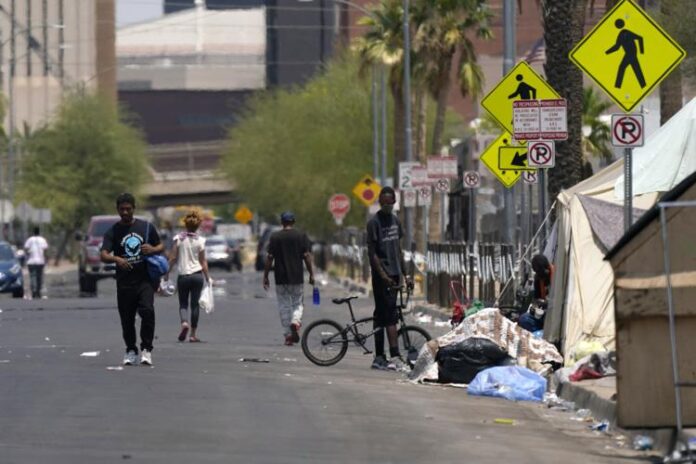Polling of Arizona voters say they favor public efforts to pull unhoused residents from their public thoroughfares but indicated they’re seeking root-cause solutions and more accountability in spending their tax dollars.
Polling firm Seminal Strategies conducted the survey on behalf of the Cicero Institute from June 28 to July 3. The nonprofit advocates for more temporary housing programs and accountability for spending on programs that do so, stressing that long-term housing of those formerly on the street is ineffective and leads to cronyism.
The poll showed 78% of 1,509 likely voters said homelessness in Arizona is getting progressively worse. The sentiment was bipartisan, with 74% of Hispanic and Democratic voters agreeing; 70% of Independents did too, with 80% of self-identified Republicans also in support.
Moreso, 80% of all likely voters supported removing the people from the streets and moving them into shelters where they could receive treatment for mental illness and addiction.
“This is an emerging issue where Arizonans are looking for solutions, and the data shows there is bipartisan agreement on the path forward,” said Cicero Action Executive Director Bryan Sunderland. “This is both a public safety and a humanitarian issue. Together, we can transform this challenge into an opportunity for lasting change.”
The Arizona Legislature directed $210 million to address homelessness in its most recent budget, with much of that referred to cities and counties to implement. The poll responses hint at skepticism about how those tax dollars are spent.
A total of 71% of respondents support state audits of local government agencies spending on homeless issues.
Maricopa County’s annual point-in-time count from January showed 9,642 unhoused people in the county, with more than 4,900 of those unsheltered. The PIT count has increased every year it’s taken since 2017.
“The issue of homelessness is an area where Maricopa County has been involved as one of the primary funders supporting services for many decades,” a Maricopa County spokesman told The Center Square. “The results of the poll are not surprising given the increased number of people experiencing homelessness in cities throughout the county. This has made the issue more visible as people have sought shelter using tents.”
The spokesman added that the Board of Supervisors had appropriated more than $500 million to prevent homelessness with mechanisms like rental assistance, responding to the immediate needs of the unhoused with shelters and cooling stations, and long-term solutions such as affordable housing.
Maricopa’s epicenter for homelessness had been an area of downtown Phoenix referred to as “the Zone” until a court order forced the city to clear the encampment over the summer. A spokesperson for the city wouldn’t comment on the poll but listed several efforts it had taken to combat homelessness, including committing $140 million to homeless solutions.
The city added 592 new shelter beds in 2022. An additional 900 shelter and transitional beds will become available in 2023 and 2024, according to officials.
Respondents also showed moderate support for a ban on public camping tied to funding for emergency housing.
The majority, 81%, of those polled felt it more compassionate to move the unhoused into available shelters rather than letting them camp where they choose. If shelter options are available, 71% opposed allowing encampments on streets or other public places.
Fifty-six percent agreed that funding for homeless should be tied to bans on street encampments. The figure was similar among Hispanic respondents and rose to nearly two-thirds for Black voters.
Gov. Katie Hobbs vetoed legislation in June that would have criminalized public encampments, saying the bill did nothing to solve the root cause of homelessness.
Should the legislation have become law, the state could have faced a court challenge under a 2018 decision by the Ninth Circuit Court of Appeals. It ruled bans on sleeping in public spaces unconstitutional when no other options were available.
States and cities outside of the Ninth Circuit’s jurisdiction have acted on public camping bans. Most recently, Georgia’s Senate Bill 62 – which requires cities to enforce public camping bans – went into effect this summer.
Last fall, New York City Mayor Eric Adams announced a policy of involuntary hospitalization for the unhoused afflicted with mental illness.
The polling showed a consensus among all political parties and racial subgroups, 63% of all voters, favoring legally compelling individuals with a severe mental illness to enter healthcare settings for treatment and stabilization.
Republished with the permission of The Center Square.














